LogUniformPrior#
- class gammapy.modeling.models.LogUniformPrior[source]#
Bases:
PriorLogUniform Prior.
Equivalent to a uniform prior on the log of the parameter
- Parameters:
- minfloat, optional
Minimum value. Default is 1e-14.
- maxfloat, optional
Maximum value. Default is 1e-10.
Attributes Summary
Methods Summary
evaluate(value, min, max)Evaluate the likelihood penalization term (hence -2*).
Attributes Documentation
- default_parameters = <gammapy.modeling.parameter.PriorParameters object>#
- max#
Parameter of a
Prior.A prior is a probability density function of a model parameter and can take different forms, including but not limited to Gaussian distributions and uniform distributions. The prior includes information or knowledge about the dataset or the parameters of the fit.
Examples
For a usage example see Priors tutorial.
- min#
Parameter of a
Prior.A prior is a probability density function of a model parameter and can take different forms, including but not limited to Gaussian distributions and uniform distributions. The prior includes information or knowledge about the dataset or the parameters of the fit.
Examples
For a usage example see Priors tutorial.
- tag = ['LogUniformPrior']#
Methods Documentation
- static evaluate(value, min, max)[source]#
Evaluate the likelihood penalization term (hence -2*). Note that this is currently a different scaling that the Uniform or Gaussian priors. With current implementation the TS of a source with/without LogUniform prior would be different… TBD
- __init__(**kwargs)#
- classmethod __new__(*args, **kwargs)#
